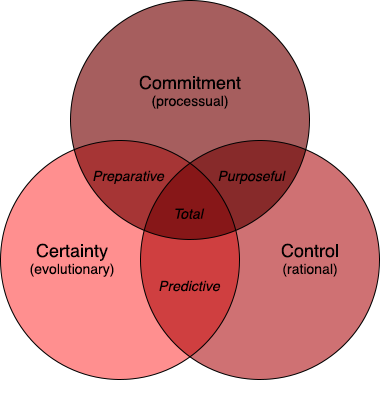Strategic Planning
Strategy is the means by which organisations deal with risks and rewards in order to achieve their objectives. As the leading risk/reward management firm, Z/Yen believes in the value of strategy, planning and strategic planning (we won’t get deep into terminology and fine distinctions). Z/Yen relationships with clients most often begin with strategic planning, yet Z/Yen does not take a formulaic approach to strategic planning, because formulas have no ‘twist’ – the unique characteristic necessary for strategic success.
Z/Yen’s proprietary risk/reward methodology’s origins lie in research into the success and failure of strategic planning techniques in practice. During a decade of research, case studies and interviews into over 300 organisations and data mining five years’ of accounts for nearly 200 of these, Z/Yen found no links whatsoever between objective measures of success and strategic planning. Strategic planning cannot be shown to work, strategic planning is not predictive, strategic planning is expensive. Many successful organisations do not plan – many successful ones do. Z/Yen’s well-supported conclusion is that organisations use strategy as a means of dealing with uncertainty, hence the emphasis in Z/Yen on dealing with risk and reward.

Viewing strategic planning as a means of dealing with uncertainty is a great help in overcoming numerous pitfalls inherent in more mechanistic approaches – the ability to deal with ‘opportunity guilt’, the reduction of the strategic/tactical divide, the dangers of not achieving ‘buy in’, the identification of what is strategically not being done, the specification of the uniqueness or ‘twist’ and a structure which can deal with real-world strategies which continue to grow and mature from the day they are formulated. Z/Yen’s strategic approach has been particularly beneficial in organisations where profit-maximisation is not the only objective, e.g. mutual, voluntary sector, government, union and trade bodies as well as businesses who pursue complex strategies. Z/Yen’s methodology has built in a range of tools – 5 forces, 7 S’s, SWOT, scenarios, added value analysis, simulation, genetic modelling, Monte Carlo, Delphi, chaos theory/complexity theory, know-how valuation, BCG models, portfolio analysis, real-options, game theory, cybernetics, soft systems - which are deployed as needed, for instance with government privatisations, technology strategies for R&D firms, strategic reviews for manufacturers, global marketing strategies for insurance firms, risk management for financial institutions, strategies for power generators, simulation of large-scale electronic trading, franchise bidding strategies for bandwidth licenses, IT strategies for numerous firms and a strategy for moving a building society to a bank.
Some clients have conducted planning exercises for years, for others it is the first time – all are impressed with the holistic approach, the balance of rigour and flexibility. Managers return again and again to the strategy to ponder, update and revise as they learn – melding day-to-day decision-making that makes organisations successful with strategic vision that makes them excel.